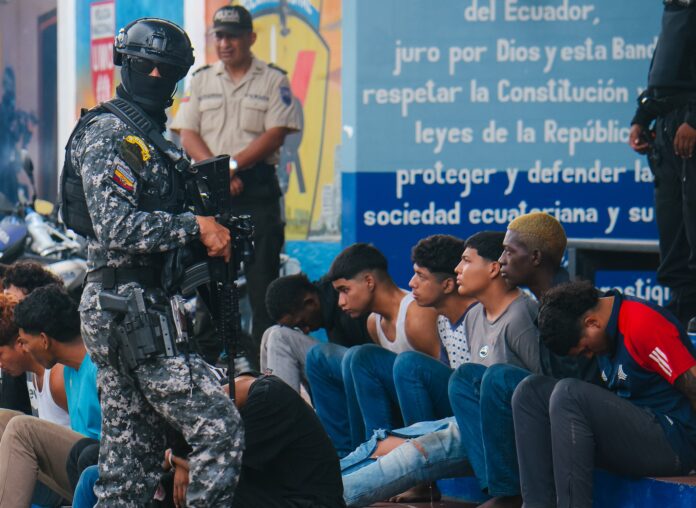

On Jan. 9, recently elected Ecuadorian president Daniel Noboa declared “internal armed conflict” and labelled 22 gangs as terrorists. The question that many Canadians and Ecuadorians living abroad ask is how did this happen?
The Aquinian’s senior writer Cesar Camacho explains the background and escalation of the conflict.
A step back
On Jan. 7, the gang leader of “Los Choneros,” Adolfo Macias, also known as “Fito,” disappeared from his Litoral Penitentiary cell after he was supposed to be moved to a maximum-security prison.
Following his escape, Noboa declared a state of emergency for 60 days, implementing a curfew from 11:00 p.m. to 5:00 a.m. to give the army the ability to regain control of the jails that have been controlled by gangs.
According to the Associated Press, from 2020 to 2023, more than 486 people died because of massive riots in prisons around the country.
Ecuador ended 2023 as the most violent country in the region with an average of 45 homicides per 100,000 citizens.
Alegría De La Parra, a third-year STU student from Ecuador, said that none of her family and friends want to leave their houses.
De La Parra has kept in close contact with her friends and family after Jan. 9. Even though her family is safe, “you never know.”
“At first, I was really scared. I think I had my first actual panic attack because my brother was in the streets of the Malecon [downtown Guayaquil], so I thought it was over for him,” said De La Parra.
Since the start of 2024, at least seven penitentiaries have been seized by the prisoners, taking custody of more than 200 staff. In addition, an unconfirmed number of prisoners have escaped including Fabricio Colón Pico, also known as “Captain Pico,” leader of the gang “Los Lobos.” His reincarceration has not been confirmed yet.
Related: Ecuadorian students react to political crisis, violence at home
What happened on Jan. 9?
At around 2:15 p.m, the television station TC Televisión was taken by a terrorist group.
For almost 15 minutes, everyone in the country could turn on the TV and see the channel’s journalists and staff being held hostage at gunpoint. Later that day, when police took the station back, major César Zapata confirmed that 13 people were detained and processed as terrorists.

A few minutes after the liberation of the station, Noboa declared “internal armed conflict,” ordering the armed forces to conduct military operations to neutralize the 22 organized criminal groups identified as terrorist organizations.
Eliana Cañizares, digital editor of the Ecuadorian newspaper El Universo, said that she heard sudden screams when she found out about the assault on the television station.
“Everyone was so in shock that no one could speak, no one was able to process what was going on,” said Cañizares in Spanish.
Cañizares said that with the current situation in Ecuador, she has to be very careful with where her name or face appears. She is very thorough with what she says because no one knows who is reading.
“This is a new kind of fear,” said Cañizares. “There is truly a possibility that I leave [Ecuador] and I don’t come back.”
“Plan Fénix”
“Plan Fénix” is the name of the strategy President Noboa is using to address the conflict the country is going through. Even though clear details remain unknown, Noboa has given some insights into what this plan might consist of through social media.
“Plan Fénix” has four main objectives. First is the creation of new penitentiaries, which is inspired by the president of El Salvador, Nayib Bukele, who he regards as an example in the fight against organized criminal groups in the region.
According to a video posted by Noboa, another goal is to reinforce the army and police officers with high-tech equipment such as high ballistic resistance uniforms, vests with ceramic panels and full-face helmets.
The third goal is to strengthen borders through militarization — Ecuador has become the principal exporter of cocaine to Europe and North America. The last goal is to promote “significant” reform in security institutions, since many authorities have been involved in corruption cases.
As a result of “plan Fénix,” 26,390 operations were executed by Jan. 19. These operations have yielded: 2,369 arrests, 158 for terrorism; 32 people liberated; 4,639 explosives and 885 firearms seized; 6,360 kilograms of drugs confiscated; and 201 prison staff released.
Life in Ecuador
Since Jan. 9, the Ministry of Education declared that all schools around the nation switched to online classes. On Jan. 22, schools are expected to go back to in-person classes, except for three provinces and two cantons. This is phase one of the Ministry of Education’s plan to return to in-person classes.
“[My friends in university] have to go back to in-person, but they’re really scared. My mom can’t go to work because it’s scary,” said De La Parra.
